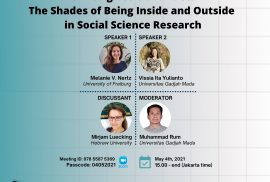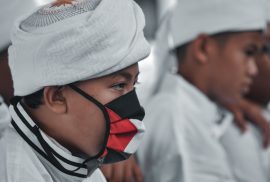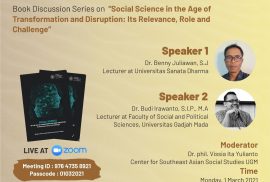[SEA-TALK #41] Book Discussion Series #5 on “Social Science in the Age of Transformation and Disruption: Its Relevance, Role and Challenge”
“Social science research is hardly objective in studying the knowing subject and has always been subjective in some respects”, said Melanie V. Nerzt and Vissia Ita Yulianto, authors of a book chapter “Shifting Positionalities: The Shades of being inside and outside in Social Science Research” (2020).
Drawing mostly on experiences in conducting anthropological tandem fieldwork as an Indonesian and a German researcher on the islands of Sulawesi and Java, Indonesia, in the course of 2010 and 2011, Melanie and Ita sets out the roles they took and were ascribed in various contexts of the field and explores the implications of being an insider and an outsider researcher.










